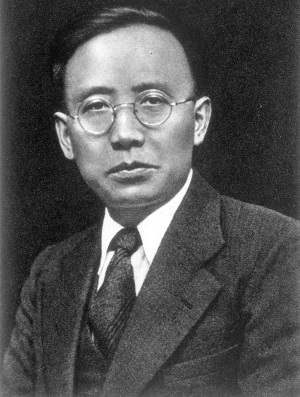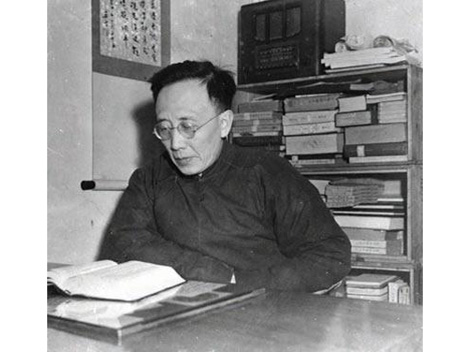<Back to Index>
- Philosopher Richard Nikolaus von Coudenhove - Kalergi, 1894
- Writer Guo Moruo, 1892
- Doge of the Republic of Venice Leonardo Loredano, 1436
PAGE SPONSOR


Guo Moruo (Chinese: 郭沫若; November 16, 1892 - June 12, 1978), courtesy name Dingtang (鼎堂), was a Chinese author, poet, historian, archaeologist, and government official from Sichuan, China.
Guo, originally named Guo Kaizhen, was born on November 10 or 16, in the small town of Shawan. Shawan is located on the Dadu River some 40 km southwest from what was then called the city of Jiading (Chia-ting, 嘉定路), and now is the central urban area of the prefecture level city of Leshan in Sichuan Province. At the time of Guo's birth, Shawan was a town of some 180 families. Guo's father's ancestors were Hakkas from Ninghua County (xian) in Tingzhou fu, near the western border of Fujian. They moved to Sichuan in the second half of the 17th century, after Sichuan had lost much of its population to the rebels / bandits of Zhang Xianzhong (ca. 1605 - 1647). According to family legend, the only possessions that Guo's ancestors brought to Sichuan were things they could carry on their backs. Guo's great - grandfather, Guo Xianlin, was the first in the family to achieve a degree of prosperity. Guo Xianlin's sons established the Guo clan as the leaders of the local river shipping business, and thus important people in that entire region of Sichuan. It was only then that the Guo clan members became able to send their children to school.
Guo's father, one of whose names may possibly have been Guo Mingxing (1854 – 1939), had to drop out of school at the age of 13 and then spent six months as an apprentice at a salt well. Thereafter he entered his father's business, a shrewd and smart man who achieved some local renown as a Chinese medical doctor, traded successfully in oils, opium, liquor, and grain and operated a money changing business. His business success allowed him to increase the family's real estate and salt well holdings.
Guo's mother, in contrast, came from a scholar - official background. She was a daughter of Du Zhouzhang, a holder of the coveted jinshi (chin-shih) degree. Whilst serving as an acting magistrate in Huangping prefecture (zhou), (in eastern Guizhou), Du died heroically in 1858 while fighting Miao rebels, when his daughter (the future mother of Guo Moruo) was less than a year old. She married into the Guo family in 1872, when she was fourteen.
Guo was the eighth child of his mother. Three of his siblings had died before he was born, but more children were born later, so by the time he went to school, he had seven siblings. Guo also had the childhood name Guo Wenbao ('Cultivated Leopard'), given due to a dream his mother had on the night he was conceived.
A few years before Guo was born, his parents retained a private tutor, Shen Huanzhang, to provide education for their children, in the hope of them later passing civil service examinations. A precocious child, Guo started studying at this "family school" in the spring of 1897, at the early age of four and half. Initially, his studies were based on Chinese classics, but with the government education reforms of 1901, mathematics and other modern subjects started to be introduced.
When in the fall of 1903 a number of public schools were established in Sichuan's capital, Chengdu, the Guo children started going there to study. Guo's oldest brother, Guo Kaiwen (1877 – 1936), entered one of them, Dongwen Xuetang, a secondary school preparing students for study in Japan; the next oldest brother, Guo Kaizou, joined Wubei Xuetang, a military school. Guo Kaiwen soon became instrumental in exposing his brother and sisters still in Shawan to modern books and magazines that allowed them to learn about the wide world outside. Guo Kaiwen continued to be a role model for his younger brothers when in February 1905 he left for Japan, to study law and administration at Tokyo Imperial University on a provincial government' scholarship.
After passing competitive examinations, in early 1906 Guo Moruo started attending the new upper - level primary school (高等小学gaodeng xiao xue) in Jiading. It was a boarding school located in a former Buddhist temple and the boy lived on the premises. He went on to a middle school in 1907, acquiring by this time the reputation of an academically gifted student but a troublemaker. His peers respected him and often elected him a delegate to represent their interests in front of the school administration. Often spearheading student - faculty conflicts, he was expelled and reinstated a few times, and finally expelled permanently in October 1909. Guo was glad to be expelled, as he now had a reason to go to the provincial capital Chengdu to continue his education there.
In October 1911, Guo was surprised by his mother announcing that a marriage was arranged for him. He went along with his family's wishes, marrying his appointed bride, Zhang Jinghua, sight - unseen in Shawan in March 1912. Immediately, he regretted this marriage, and five days after the marriage, he left his ancestral home and returned to Chengdu, leaving his wife behind. He never formally divorced her, but apparently never lived with her either.
Following his elder brothers, Guo left China in December 1913, reaching Japan in early January 1914. After a year of preparatory study in Tokyo, he entered Sixth Higher School in Okayama. When visiting a friend of his hospitalized in Sain Luke's Hospital in Tokyo, in the summer of 1916, Guo fell in love with Sato Tomiko, a Japanese woman from a Christian family, who worked at the hospital as a student nurse. Sato would become his common - law wife. They were to stay together for 20 years, until the outbreak of the war, and to have five children together.
After graduation from the Okayama school, Guo entered in 1918 the Medical School of Kyushyu Imperial University in Fukuoka. He
was more interested in literature than medicine, however. His studies
at this time focused on foreign language and literature, namely the
works of: Spinoza, Goethe, Walt Whitman, and the Bengali poet Tagore. Along with numerous translations, he published his first anthology of poems, entitled The Goddesses (女神 - nǚ shén) (1921). He co-founded the Ch'uang-tsao she ("Creation Society") in Shanghai, which promoted modern and vernacular literature. Guo joined the Communist Party of China in 1927. He was involved in the Communist Nanchang Uprising and
fled to Japan after its failure. He stayed there for 10 years studying
Chinese ancient history. During that time he published his work on inscriptions on oracle bones and bronze vessels, Corpus of Inscriptions on Bronzes from the Two Zhou Dynasties (两周金文辞大系考释). In
this work, he attempted to demonstrate, according to the Communist
doctrine, the "slave society" nature of ancient China. His theory on
the "slave society of China" remains highly controversial, although it
was praised by Mao Zedong and the party. In the summer of 1937, soon after the Marco Polo Bridge incident,
Guo returned to China to join the anti - Japanese resistance. His
attempt to arrange for Sato Tomiko and their children to join him in
China were
frustrated by the Japanese authorities, and in 1939 he remarried to Yu Liqun (于立群; 1916 – 1979), a Shanghai actress. After the war, Sato went to reunite with him but was disappointed to know that he had already formed a new family. Along with holding important government offices in the People's Republic of China,
Guo was a prolific writer, not just of poetry but also fiction, plays,
autobiographies, translations, and historical and philosophical
treatises. He was the first President of the Chinese Academy of Sciences and remained so from its founding in 1949 until his death in 1978. He was also the first president of University of Science & Technology of China (USTC),
a new type of university established by the Chinese Academy of Sciences
(CAS) after the founding of the People's Republic of China and aimed at
fostering high level personnel in the fields of science and technology. In 1966 he was one of the first to be attacked during the Great Proletarian Cultural Revolution.
He confessed that he had not properly understood the thought of Mao
Zedong and agreed that his works should be burned. However, this was
not enough to protect his family. Two of his sons, Guo Minying and Guo
Shiying, "committed suicide" in 1967 and 1968 following "criticism" or
persecution by Red Guards. Unlike
others similarly attacked, Guo's life was spared as he was chosen by
Mao as "the representative of the rightwing" in the 9th National
Congress of the Communist Party of China in 1969. He had regained much
of his influence by the seventies. Guo was awarded the Stalin Peace Prize in 1951. Guo
had five children (four sons and a daughter) with Sato Tomiko and six
with Yu Liqun (four sons and two daughters). An article published in
the 2000s said that eight out of the eleven were alive, and that three
have died.
